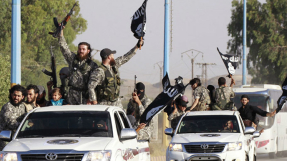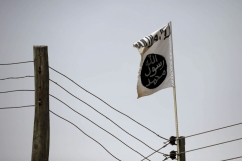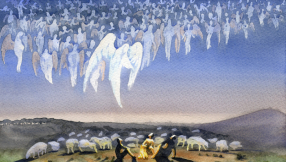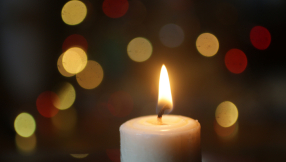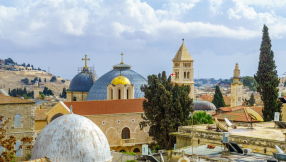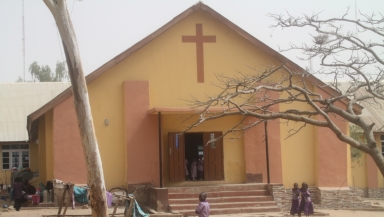
Call it coincidence, but an alarming number of the stories of Boko Haram attacks I heard when in Nigeria last week took place near churches.
Sunday mornings seem to be a favourite; while people are worshipping, their homes are ransacked and burned.
As fires blaze and shots are fired, the sounds of screaming and gunshots interrupt church services and leave worshippers with indelible memories of horror; memories gained while they were in what they considered to be a safe and holy place.
65-year-old Amos ran home from church to find Boko Haram soldiers in his home. Terrified, he couldn't think where else to hide so he shinned up a tree and sat in the branches for hours while they raided his house.
"I can't believe I managed it," he told me. "It must have been the Lord's strength."
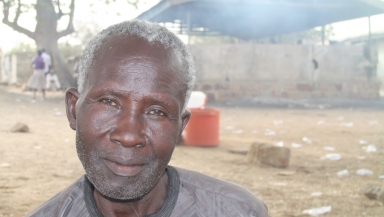
He isn't the only one to have found unexpected strength. Another Amos, a pastor from a town in northeastern Nigeria, was in his church office when his wife came in to find him. With a worried look on her face, she told him there were two Boko Haram militants standing across the street, watching the church.
With his wife, Amos went to look outside. He saw the Nigeria military soldiers leaving the town, frightened by Boko Haram. So, he gathered up his family into the car, without time to pick up any belongings, parked ten kilometres from the town and told his wife and children to sleep while he kept watch. During the night, he saw the soldiers return, so when the sun started to rise, they made the journey back.
As they returned, they found the church full of people, scared and looking for help. Pastor Amos said: "I saw the church members trooping into the church, crying, shouting, and even some soldiers were saying 'Pastor, what are you waiting for? Leave this place!'
"So I gathered people into the bus, the church bus, my family, another family, some church members, we crowded into the bus, so we went out and that's the day we left completely and we never went back again.
"As we were driving, they were following us, Boko Haram."
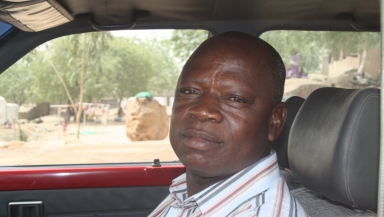
Having fled in fear for his life, Pastor Amos is now among those who are running food distributions in the grounds of churches, serving others who have had equally horrifying experiences.
The situation in northeastern Nigeria is so chaotic that you're hard pushed to find someone who hasn't been attacked or abducted, or who hasn't lost family members to Boko Haram.
Muslims as well as Christians are vulnerable. Many don't want to fight with Boko Haram, but in some parts of the country the only way to avoid that is to run. So they too become displaced, homeless and desperate. In some communities, Christians open their homes to Muslims and Muslims to Christians. They have all experienced horror.
Many people talk of having been abducted and then managing to escape. The houses where Boko Haram are holding people don't appear to be as secure as perhaps the militants would like.
One woman told me of managing to escape while the militants were rushing around getting ready for a terror operation. Another said her Boko Haram driver – himself coerced into fighting with them, against his will – let her go.
A church worker told of his three children having been abducted and held in a house where there was later an explosion. During the melee, his little boy escaped but his teenage daughter had a leg blown off in the blast. She was eventually freed a month later, with her sister, when the town where they were held was reclaimed by the Nigerian government and Boko Haram were evicted.
So, the same churchgoers are both survivors of Boko Haram attacks and volunteers serving others who have been displaced.
Church grounds are used as makeshift camps, and church workers quickly become overwhelmed by the thousands of people who come to sleep there in search of safety.
It's not easy for them to manage the pressures of having so many people turn up at once. In some camps, there aren't enough latrines so people resort to defecating on open ground. Food distributions are difficult to oversee, and inexperienced church volunteers need help to set up registration systems to make sure no-one gets missed.
Organisations like Tearfund, with long experience of working in disaster zones around the world, are able to bring some expertise from similar emergencies in other countries. Other aid agencies are here too, and the UN are now helping the existing government co-ordination efforts.
But faith is very important in Nigeria, and people of all faiths inevitably look for places of worship in which to find sanctuary. And, while many of the displaced people are Christians, many others have also been terrorised by Boko Haram and refused to fight with them, so they too are looking for refuge.
It's at times like these that churches are put to the test. While dealing with their own trauma, Christians are reaching out to others, whoever they are and wherever they're from.
My colleague Danladi Musa, who oversees Tearfund's work in Nigeria, said: "Faith is extremely important in our culture, and people identify strongly as either Christian or Muslim. It has been a privilege for us as Christians to serve people who are Muslims as well as those who share our faith. This is surely what love is."










